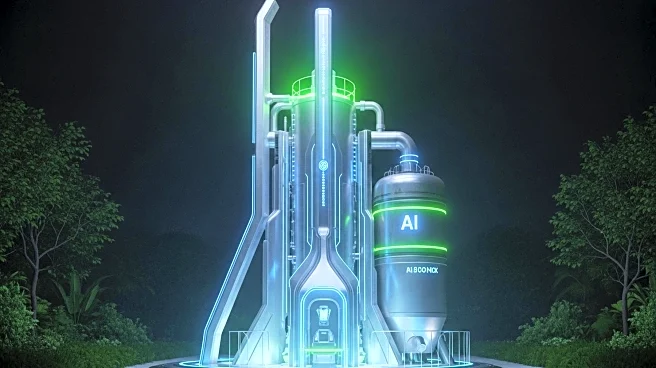What's Happening?
The biomanufacturing industry is undergoing a transformation with the advent of Bioprocess 5.0, which integrates advanced digital technologies, automation, and sustainability principles. This new era aims to streamline the production of biological products such as pharmaceuticals, vaccines, and enzymes. Key features include the use of artificial intelligence (AI) tools to optimize bioprocess parameters in real-time, enhancing quality and standardization. Digital twins, which simulate processes, are employed to test scenarios and minimize risks, thereby increasing process consistency and speed-to-clinic. The industry is also focusing on sustainability, with companies like MilliporeSigma aiming to increase their use of renewable energy. The integration of human-centric automation is emphasized, where digital tools work alongside humans to enhance manufacturing capabilities.
Why It's Important?
The shift to Bioprocess 5.0 is significant for the pharmaceutical industry as it promises to improve efficiency, reduce errors, and accelerate the development of therapies. By leveraging AI and digital tools, companies can make faster decisions and reduce batch failures, which is crucial for meeting the growing demand for personalized medicine. The focus on sustainability aligns with global efforts to reduce environmental impact, making bioprocessing more eco-friendly. This transformation could lead to more accessible and affordable therapies, particularly for rare diseases, by enabling scalable production methods. The collaboration between technology providers and manufacturers is essential to achieving these goals, potentially benefiting a wide range of patients with unmet medical needs.
What's Next?
The industry is expected to continue its transition towards more sustainable and efficient bioprocessing methods. Companies will likely increase their investment in AI and digital technologies to further enhance their manufacturing capabilities. The focus will remain on developing scalable solutions for personalized therapies, such as CAR T cell therapies, to reach larger patient populations. Regulatory bodies may also adapt their frameworks to accommodate these advancements, ensuring that new therapies can be brought to market more quickly and safely. The ongoing collaboration between biopharmaceutical companies and technology providers will be crucial in driving these innovations forward.
Beyond the Headlines
The integration of AI and digital tools in bioprocessing raises ethical and regulatory considerations, particularly regarding data privacy and the role of human oversight in automated systems. As the industry moves towards more personalized therapies, there may be challenges in ensuring equitable access to these treatments. The focus on sustainability also highlights the need for companies to balance economic goals with environmental responsibilities. These developments could lead to long-term shifts in how biopharmaceutical companies operate, potentially influencing global health policies and standards.










